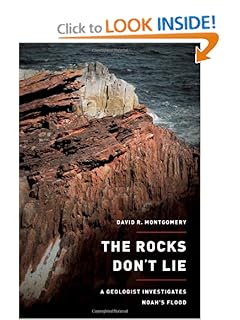book response: The Rocks Don't Lie by Montgomery (2012)
David Montgomery is a geomorphologist at the University of Washington and has written a great historical explanation that any honest young earth creationists should read. Angry atheists should read this as well since Montgomery is a great model of irenic persuasion.
He surveys throughout the book several flood myths, and notes their connections to historical events. He also notes how the myths change depending on the location around the world. For example, China does not have a world flooding story with a character like Noah who saves the animals. China's floods come from it's great rivers in deep valleys, not like Mesopotamia's great rivers through broad plains. Nor did China experience a great sea rising like the Black Sea's. He also goes into the development of the science of geology. It's an historical development that developed in the West alongside the influence of the rising Protestant church. As different hypotheses formed about how rocks formed while keeping Noah's worldwide flood in context, Noah's flood kept falling to the wayside.
Early on in the church's history, the age of the earth and the extent of Noah's flood, were not issues to worry about. The church's creeds had nothing to say about these topics. The creeds, Apostles', Nicene, Chalcedonian, and Athanasian, were focused on the Trinity, Jesus, the resurrection, and salvation. But by the 20th century, a subset of the Christian fundamentalists insisted on the young earth and Noah's worldwide flood contrary to physical evidence and church history. Their influence has been tremendous in the United States even to this date. Montgomery's hope in this book is to point out that even those who were even from the young earth fundamentalists have realized their arguments, both scientifically and biblically, were bad, false, or wrong. And contrary to young earth creationist assertions, believers have believed in an old earth and in evolution without losing their faith.
Here are some of my favorite quotes mentioning some of those believers
.
He surveys throughout the book several flood myths, and notes their connections to historical events. He also notes how the myths change depending on the location around the world. For example, China does not have a world flooding story with a character like Noah who saves the animals. China's floods come from it's great rivers in deep valleys, not like Mesopotamia's great rivers through broad plains. Nor did China experience a great sea rising like the Black Sea's. He also goes into the development of the science of geology. It's an historical development that developed in the West alongside the influence of the rising Protestant church. As different hypotheses formed about how rocks formed while keeping Noah's worldwide flood in context, Noah's flood kept falling to the wayside.
Early on in the church's history, the age of the earth and the extent of Noah's flood, were not issues to worry about. The church's creeds had nothing to say about these topics. The creeds, Apostles', Nicene, Chalcedonian, and Athanasian, were focused on the Trinity, Jesus, the resurrection, and salvation. But by the 20th century, a subset of the Christian fundamentalists insisted on the young earth and Noah's worldwide flood contrary to physical evidence and church history. Their influence has been tremendous in the United States even to this date. Montgomery's hope in this book is to point out that even those who were even from the young earth fundamentalists have realized their arguments, both scientifically and biblically, were bad, false, or wrong. And contrary to young earth creationist assertions, believers have believed in an old earth and in evolution without losing their faith.
Here are some of my favorite quotes mentioning some of those believers
.
In 1954, influential Baptist theologian Bernard Ramm critiqued creationism from an evangelical perspective in The Christian View of Science and Scripture. Ramm argued against a recent global flood...To set science against religion was to set creation against creator. "If the author of Nature and of Scripture are the same God, then the two books of God must eventually recite the same story." Ramm advised evangelical Christians not to confuse interpretation with revelation. Just because the Bible was the infallible Word of God did not mean that it was always obvious as to what it meant regarding scientific matters. Confidence that one understood the clear meaning of scripture did not necessarily mean one did. pp. 197-8
Pointing out discrepancies in the genealogical listings presented in different books of the Bible, [Davis A.] Young maintained that the obvious interpretation may not always be the correct one. He held that a careful reading of the Bible revealed no fundamental conflict between science and Christianity...Young also complained that Christians who defend traditional ideas of the Flood were too quick to appeal to miracles to help them evade scientific difficulties. It was telling how those seeking to support a global deluge consistently claimed as much scientific support as they could marshal and then invoked miracles when their own explanations broke down. pp. 237-8
In fact, the founding fundamentalists did not want to choose between science and religion. One, they believed, leads to greater understanding and knowledge about the way the world works, and the other provides moral and spiritual guidance in navigating the complexities of life, culture, and society. Seen in this light, the varying interpretations of the biblical flood story are part of an ongoing battle for the soul of Christianity. Will it remain a dynamic faith that helps people navigate modern times and understand the world and our place in it? Or will Christianity become locked in a senseless war against reason, as St. Augustine feared? Only time will tell. pp. 250-1





Comments